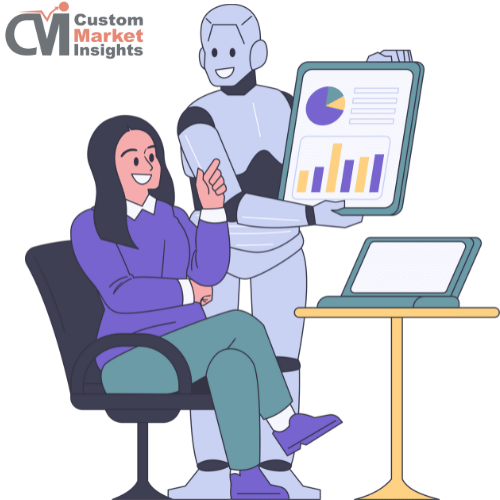Introduction: A New Era of Mental Wellness
We are confronting a global mental health epidemic of unprecedented proportions. Increasing anxiety, depression, burnout, and loneliness, accelerated by the COVID-19 pandemic, have laid bare serious shortfalls in traditional mental health care systems. Enter AI, a transformative technology that is transforming the paradigm from reactive mental health care to proactive, personalized assistance. From AI-driven chatbots evaluating expressions and tone to predictive analytics, artificial intelligence is now a critical tool in tackling mental health issues at scale.
As CMI Market Research put it in a report, “The world market for AI in mental health is expected to grow at a CAGR of 37.2% over the forecast period due to the rising awareness of mental health, tech-based therapy models, and demand for 24/7 support.”
The Mental Health Landscape – Where Traditional Approaches Fall Short
Conventional mental health care is often characterized by stigma issues as well as a lack of access to qualified professionals and high cost. Millions do not have access to adequate, timely care. The World Health Organization (WHO) has reported that globally, 1 in 8 individuals suffers from a mental health disorder. Despite such prevalence, the psychiatrist population-to-patient ratio remains alarmingly skewed, especially in lower-middle-income and low-income countries.
The waiting period is too long, and the cost of therapy is too high, and in most cases, people are too embarrassed to be seen by a mental health professional. Super Easy AI has developed a scalable solution to overcome these barriers.
How AI Is Transforming Mental Health Care:
AI doesn’t just automate; it goes human. In the field of mental health, AI devices are designed to mimic empathy, identify emotional patterns, and provide immediate, impartial support. Here’s how:
AI-Driven Chatbots and Virtual Therapists: Chatbots such as Woebot, Wysa, and Replika, all of which are gaining popularity as non-intrusive friends for users with stress, anxiety, or a low mood. These are bots that converse well using NLP techniques, applying CBT and gaining hits. You can be yourself here, and nobody will judge you.
Emotion/Sentiment Analysis: Never before could AI read voice, facial expressions, and text and ascertain emotional suffering tendencies more tightly than that three-mile-an-hour- analyst. Companies are deploying AI emotional-recognition software to trigger alerts for caregivers or loved ones if a user is showing signs of suicidal ideation or deep clinical depression.
Early Detection through Predictive Analytics: User activity can be tracked over time to observe changes in speech patterns, sleep, or social media use, and, through an AI model, a mental health decline can be predicted before it becomes a severe problem. This preemptive method enables interventions to be implemented at an early stage, mitigating the risk of crisis.
Traditional vs. AI-Based Mental Health Solutions
Here’s a quick comparison of how AI is changing the game in mental healthcare:
| Aspect | Traditional Mental Health Support | AI-Powered Mental Health Tools |
| Accessibility | Limited by geography and cost | Available 24/7 via apps and mobile platforms |
| Response Time | Delayed appointments | Instant feedback and support |
| Cost | Often expensive and uninsured | Low-cost or freemium models |
| Personalization | Based on therapist’s judgment | Data-driven, behavior-based customization |
| Stigma | Fear of social judgment | Anonymity encourages open communication |
| Scalability | One-on-one therapy limitations | Scalable across millions of users simultaneously |
The next stage of AI-driven mental health guidance involves the advanced integration with wearables and IoT. Wearable sensors, such as Fitbit, Oura Ring, and the Apple Watch, now evaluate heart rate variability, sleep quality, and stress markers. These wearables, which are connected to AI systems, track mood and send behavior suggestions instantly. A relatively low amount of sleep or high pulse, for example, could signal to the user to engage in a relaxation mindfulness exercise or communicate with a facilitator.
Mental Health in the Workplace: AI-Enabled Wellbeing
Work-related stress is a key contributor to this negative trend. Companies are using AI-enabled wellness systems that monitor employee stress, recommend guided meditations, and refer them to a therapist, among other tools. Ginger and Modern Health are among the companies helping HR departments build AI-boosted EAPs, employing both human therapists and digital self-care tools. With AI analytics, businesses can even take stock of their employees’ mental state, protecting their privacy through anonymized data so that wellness is custom-fit but not invasive.
Ethical and privacy concerns arise from AI-based mental health remedies, which offer advantages but also present specific ethical dilemmas. Emotion data should be kept under strict privacy standards, such as HIPAA or GDPR. The danger of AI ‘tool ’ -ification looms, where we become over-reliant on such tools, and our empathy in human life and death decisions atrophies. Thus, a collaboration between AI and human experts has to be set up, and AI should not replace humans.
Algorithmic bias: Software developers and clinicians need to be mindful of this algorithmic bias. AI systems developed mainly in Western, English-speaking societies might not perform as effectively in other cultural settings. Ensuring the accuracy and fairness of the data is important for the effectiveness of AI mental health tools.
The Future: A Hybrid Care Model
The most intriguing future for AI in mental health likely will involve collaboration between digital intelligence and human warmth. With AI perhaps stepping up at the A2 level to provide alarms and the equivalent of treatment check-ins, not to mention daily check-ins, the qualified therapist remains of utmost importance to make difficult diagnoses and sustain loving care.
Artificial intelligence-enhanced telepsychiatry could emerge as the new standard. Imagine a scenario where a wearable device detects a mood drop, initiates a chat with a chatbot, and schedules a virtual appointment with a human therapist in less time than it takes to boil water. That’s what mental health care will look like in the future: hyper-efficient, smart, and deeply humanistic.
Conclusion: Enhancing AI Welfare Support: AI is not just enhancing mental health care; it is redefining it. We are on the cusp of AI revolutionizing the landscape by breaking down access barriers, normalising mental ill health, and offering specifically tailored care, and thus laying the foundations for mental health equality worldwide. Its survival will depend on ‘ethical’ use, cultural understanding, and human oversight. We cannot solve the global burden of mental illness overnight. With AI used rightly, we are gradually journeying to a not-too-distant world where mental wellness is available to all, for all, by all.
Connect with our Experts


